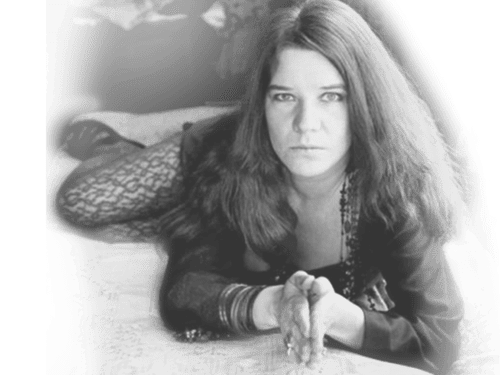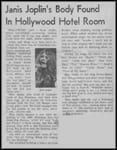LOS ANGELES — An indelible icon of the ’60s, Janis Joplin chugged Southern Comfort on stage, had affairs with women and men and cruised the streets of Los Angeles in a Porsche 365 Cabriolet painted in a far-out psychedelic design.
But the free-spirited blues empress, who died of a heroin overdose at age 27, also talked hopefully of marriage, babies and a home, complete with traditional white-picket fence.
No wonder nearly three decades later she remains such a dichotomy — and her story continues to tantalize Hollywood.
Although her rise and fall encompassed just four furious years, efforts to make a movie about Joplin’s stormy life have spanned more than a quarter century.
That pursuit continues, via dueling Joplin biopics, which have been in on-again, off-again development since early 1996 and are now racing to beat one another to production. One of the movies, currently scheduled to begin shooting next spring, is authorized by the Joplin estate; the other is not.
Both sides are already airing their disagreements. Producers involved with the unauthorized effort, “Piece of My Heart,” claim their movie will tell the warts-and-all story, arguing that the rival film will be “candy-coated.”
“That’s not true!” retorted Nancy Savoca, the writer-director of the yet-untitled authorized venture, who said that when she met with members of the Joplin family, “not one word was said about what we could and couldn’t do.”
Joplin is not the only rock legend slated for the Hollywood treatment in coming months. Movies are being produced or developed about Otis Redding, Elvis Presley, Brian Wilson, Phil Spector and others.
But the history of the Joplin projects proves just how difficult — and how desirable — it is to make movies about rock legends. On one hand, filmmakers like the fact that rock stars often have led dramatic lives and can translate into big box office.
Unfortunately, securing the rights to songs and recorded performances is expensive; they are often held by several different entities.
Filmmakers must placate the star and his or her family members and friends, who often end up disappointed with the results anyway. After initially calling the film “very good,” Jerry Lee Lewis later called “Great Balls of Fire,” the 1989 flop movie about his own life, “the disaster of the century.”
Most troubling for studios, rock biopics have a spotty record. While there have been a few hits — most notably “La Bamba,” a 1987 sleeper about rocker Richie Valens that grossed $54 million — disappointments include “Why Do Fools Fall in Love,” about ’50s teen crooner Frankie Lymon that earned just $13 million, and “Selena” (1997), about the slain Tejano singer.
Indeed, some are skeptical whether Hollywood can ever do right by a complicated performer such as Janis Joplin.
“It’s so easy to fall for the cliche of the tortured artist,” said Ray Manzarek, former keyboardist for the Doors, who is himself a fierce critic of Oliver Stone’s movie about the ’60s band. “What needs to be found are the motivations — the real motivations of the real person. And the real meaning behind the music.”
A Joplin biopic has been a long time coming.
Born and raised in Port Arthur, Texas, Joplin was 20 when she left college and hitchhiked to San Francisco and its coffeehouse scene of 1963. Three years later, amid the city’s musical explosion, she became the singer for the Haight-Ashbury-based band Big Brother & The Holding Company. The band went on to sign with Columbia and record the album “Cheap Thrills,” which included the hit single “Piece of My Heart.”
Trailblazer
Today she is widely perceived as the first female superstar of rock, a trailblazer for Madonna, Janet Jackson and Courtney Love. Because of her drug death, she also became emblematic of the perils wrought by the combination of sex, drugs and rock ‘n’ roll.
“She was the original bad girl,” said author Alice Echols, a Sixties historian who spent five years researching Joplin’s life for the coming biography, “Scars of Sweet Paradise: The Life and Times of Janis Joplin” (MetropolitanBooks).
Pointing to Joplin’s stature within the rock world, Echols added, “Her stardom defied all probability. I mean, her face was acne-scarred. She was slightly chunky. She had this frizzy, fly-away hair. Her voice was not conventionally pretty. On top of which, she deliberately lived on the margins.”
In a way, Hollywood has already visited the Joplin story.
After reading about newcomer Bette Midler in a 1972 Newsweek cover story, producer Marvin Worth saw her perform in West Hollywood. “And I was so stunned by what I saw, and heard, that I had to find a movie project for her,” he once related. Worth optioned Joplin’s music with hopes of having Midler portray the rock diva in “The Pearl.” The title was borrowed from a Joplin tune and was also the singer’s nickname.
`The Rose,’ instead
But after complications arose with the studios, Worth abandoned the Joplin project and instead made a movie about “a composite character” of the Sixties. For her screen debut in the 1978 film “The Rose,” Midler was Oscar-nominated. But the film’s parallels to the Joplin story did not go unnoticed, so interest in a real Joplin movie bio tapered off.
“There was this attitude in Hollywood that the Joplin story had already been done,” said attorney Bob Gordon, who represented Joplin during her lifetime and today represents her estate’s heirs.
But over the years, with the reissue of Joplin’s music, her induction into the Rock and Roll Hall of Fame and the use of one of her songs in Mercedes-Benz TV commercials, there was renewed interest in her life rights.
Producer Peter Newman inquired about the rights eight years ago, only to learn they were tied up by theatrical producer Manny Fox.
“Then, about four years ago, they became available. And we immediately called and made a deal,” Newman related. In addition to acquiring rights from the Joplin family, and life rights to members of Big Brother & The Holding Company, Newman acquired the rights to most of Joplin’s music, and to the 1992 book “Love, Janis,” written by Laura Joplin.
Lili Taylor will star in the $15 million movie, and Jonathan Demme will produce it.
Major interest
Meanwhile, the competing film, put together by producer Marc Frydman and director Marc Rocco, was attracting interest all over Hollywood. Frydman tied up rights to the National Book Award nominee “Buried Alive: The Biography of Janis Joplin,” by Joplin’s close friend Myra Friedman, who handled the singer’s media relations; a script by rock video director Julie Cypher; and, as the star, singer Melissa Etheridge (who happens to be Cypher’s girlfriend). Significantly, Frydman also acquired the rights to “Piece of My Heart,” at a reported cost of $1.1 million.
The project, with $35 million budget, was then taken to Paramount-based Lakeshore Entertainment, which brought in a different director, Stephen Gyllenhaal (“Home Grown”). Then came script rewrites. And then a third director, Gary Fleder (“Kiss the Girls”). After an evidently disappointing Etheridge screen test, there was also a new star search. The role has yet to be cast.
It’s still too early to say which project will be more faithful to Joplin’s life or to the spirit of her music. But each side remains confident that the raw material of Janis’ life — raw in every sense of the word — will be enough to make audiences flock to their film.





